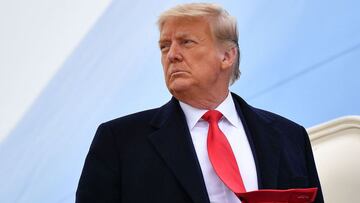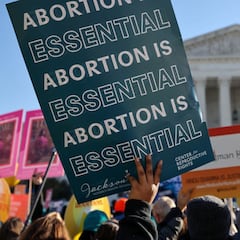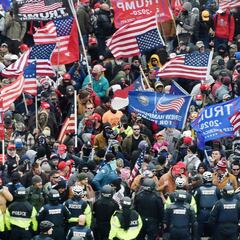Could Trump be accused of encouraging capitol riot according to judge?
Attorneys for former US president Donald Trump attempted to get a federal judge to dismiss lawsuits against him. The response was unlikely to please them.

On Monday, the lawyers acting on behalf of former US president Donald Trump asked a federal judge to throw out a series of lawsuits by Democratic lawmakers and two police officers alleging that he had incited the deadly assault on the US Capitol on 6 January 2021.
Could Donald Trump end up in court?
The three lawsuits, by Democratic US representatives including Eric Swalwell and Jerry Nadler, as well as two Capitol Police officers who battled rioters claim that Trump is liable for injuries to police and lawmakers.
"The congressional Democrat plaintiffs are hoping this court will help them score points against a political rival at the expense of the Constitution," Trump lawyer Jesse Binnall said at the start of a court hearing.
"That is an invitation this court should decline."
NEWS: Attorneys for Donald Trump have met in person with the Fulton County District Attorney's Office in Georgia. pic.twitter.com/FK8Zy1LHLw
— Maddow Blog (@MaddowBlog) January 11, 2022
The Democratic lawmakers have invoked an 1871 law passed to fight the white supremacist Ku Klux Klan that prohibits political intimidation. The lawsuits charge that the worst attack on the US Capitol since the War of 1812 was a direct consequence of Trump's actions, including a fiery speech he gave shortly before thousands of his supporters stormed the building to try to overturn President Joe Biden's election.
Judge Mehta questions Trump actions
During the court hearing, Judge Amit Mehta repeatedly noted that on the 6 January in question Trump had urged the gathered crowd to march on the Capitol, but that he later didn't speak up - for two hours - to request that those same people stopped the violence that was in clear sight.
Donald Trump admits on stage that he got a vaccine booster shot, but his Dallas audience then begins to boo him. Hope his supporters will listen—#Omicron is coming. #GetBoosted #vaccinate pic.twitter.com/Oq4QynKdjt
— Eric Feigl-Ding (@DrEricDing) December 20, 2021
"The words are hard to walk back," the judge said. "You have an almost two-hour window where the President does not say, 'Stop, get out of the Capitol. This is not what I wanted you to do.'"
"What do I do about the fact the President didn't denounce the conduct immediately... and sent a tweet that arguably exacerbated things?" Mehta asked. "Isn't that, from a plausibility standpoint, that the President plausibly agreed with the conduct of the people inside the Capitol that day?"
US District Judge Amit Mehta did not issue a ruling after Monday's hearing, but his comments did shed some light on whether Trump and allies can be held liable in a civil court for the deadly Capitol siege.
Trump impeached but Senate acquitted
Trump was impeached by the House of Representatives and acquitted by the Senate on a charge of inciting the riot, which is also under investigation by a House select committee.
Media: @eliehonig to @EricaRHill on NY AG @TishJames' subpoenas of @IvankaTrump and @DonaldJTrumpJr in the civil investigation: "They can comply and testify, They can take the Fifth, or they may move to quash this subpoena [saying] it's politically motivated and inappropriate." pic.twitter.com/x1Cghakx1e
— Porter Anderson (@Porter_Anderson) January 3, 2022
Swalwell's lawsuit includes similar claims against Trump allies who also spoke at the 6 January rally, including campaign lawyer Rudy Giuliani, Trump’s eldest son Donald Trump Jr., and Republican congressman Mo Brooks.
Brooks has sought to dismiss Swalwell's claims, arguing his remarks at the 6 January rally were within the scope of his duties as a House member. A law called the Westfall Act protects federal employees from being sued for actions taken as part of their jobs.
Trump and his co-defendants have argued that their remarks preceding the 6 January attack were political speech protected by the First Amendment of the US Constitution.
Related stories

What did Justice Brett Kavanaugh say in the Supreme Court abortion law hearing?
"Plaintiffs are all members of Congress; each has engaged in controversial speech," Binnall wrote in a court filing. "Yet they have chosen to foreswear their oaths to support and defend the Constitution by attempting to undermine the First Amendment by bringing this lawsuit, based on their longstanding and public grudges against President Trump."
The two Capitol Police officers who sued Trump are James Blassingame and Sidney Hemby.
